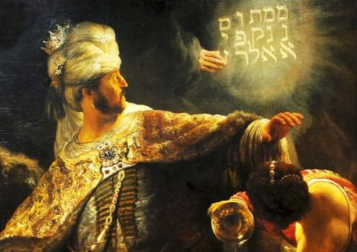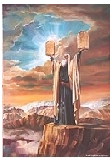LUCIFER?
PMW 2023-090 by Kenneth L. Gentry, Jr.
Isa. 14:12 is a little understood text. The KJV’s translation has the word “Lucifer” here. “Lucifer” (“light-bearer”) is the Latin Vulgate translation of the Hebrew helel, which means “shining one.” This translation has helped promote a radical misunderstanding of the text in the modern world.
“How art thou fallen from heaven, O Lucifer, son of the morning! how art thou cut down to the ground, which didst weaken the nations!” (KJV)
Despite popular opinion today (and by many ancient and medieval writers), Lucifer is not Satan. Notice: (1) The taunt is clearly directed against “the king of Babylon” (v. 4). (2) It speaks of the fall of “the man who made the earth tremble” (v. 16), who has “ruined your country” (v. 20). (3) It associates him with other earthly kings who have died (vv. 18–19). (4) It speaks of his burial problem (v. 20). (5) Furthermore, this taunt-oracle opens a series of prophecies against various earthly kings: Babylon (14:4), Assyria (14:24), Philistia (14:29), Moab (15:1), Damascus (17:1), Egypt (19:1), Jerusalem (22:1, 9–10), and Tyre (23:1). It would be out of keeping with the series to import Satan into this taunt.
Unfortunately, much confusion arises from not properly dealing with the poetic genre in which this oracle appears. Poetry allows extravagant description such as applied here to “Lucifer” (i.e., the king of Babylon). In the very context we read of trees rejoicing and speaking (14:8a) because war ceases with his death (v. 7) so that trees will no longer be cut down to make siege weapons (v. 8b).
 Contemporary Theological Issues
Contemporary Theological Issues
by Ken Gentry (21 mp3 downloadables)
A Christian college course dealing with contemporary theological debates within the church. Covers several important topics of concern to Christians, including abortion, homosexuality, alcoholic beverages, and more
See more study materials at: www.KennethGentry.com
“Lucifer” is better translated as “shining one,” referring to Venus, the morning star (as per the NASB and NRSV; similarly, ASV, ESV, NIV, RSV). This fits well with the astrological and polytheistic commitments of the Babylonian king who sought to raise himself above all others.
Isa. 14:12: How you have fallen from heaven, / O star of the morning (NASB)
In antiquity the collapse of a great political leader or nation is often called a fall from “heaven.” We see this in Cicero, ad Atticum 2:21; Philippicum 2:41; Horace, Epodes 17:41; etc.
Isa. 14:13–14: you said in your heart, / I will ascend to heaven
In these two verses we hear the Babylonian king’s proud boasting: we read “I” five times. And we see multiple references to height: “ascend,” “heaven,” “above the stars,” “sit on the mount,” “above the heights of the clouds,” and his desire to be “like the Most High.” He was determined to sit regally in the “mount of assembly” of the gods in “the north [Heb., saphon].” In Ugaritic poems, Saphon is the place where Baal is enthroned.
Isa. 14:15: you will be thrust down to Sheol, / To the recesses of the pit
For all the king’s wordy boasting, God quickly disposes of him. In vv. 13–14 his lengthy boast employed eighteen words in Hebrew, whereas God only uses five Hebrew words to discard him (v. 15). All of his pompous boasts of ascending the heights are replaced with the lowest places where he will actually end up: He will be “thrust down,” “to Sheol,” even to the “recesses of the pit” (v. 15). When man attempts to be equal with God, his fall into ruin is sure (cf. Gen. 3:5, 16–24; Eze. 28:2, 6–10).
 Revelation, God and Man
Revelation, God and Man
(24 mp3 lectures by Ken Gentry)
Formal Christ College course on the doctrines of revelation, God, and man. Opens with introduction to the study of systematic theology. Excellent material for personal study or group Bible study. Strongly Reformed and covenantal in orientation.
See more study materials at: www.KennethGentry.com
Isa. 14:18–20: you have been cast out of your tomb
In antiquity burial monuments for kings were important, as we may discern from the most remarkable ones, the Egyptian pyramids. Hence, “all the kings … each in his own tomb” like in glory. But the Babylonian king will not be accorded a decent burial, becoming instead like a “trampled corpse” (vv. 18–19).
Kenneth L. Gentry Jr.'s Blog
- Kenneth L. Gentry Jr.'s profile
- 85 followers



